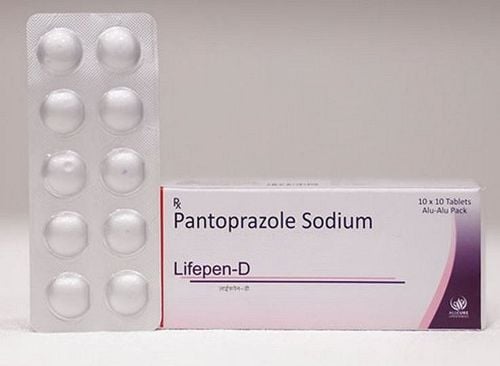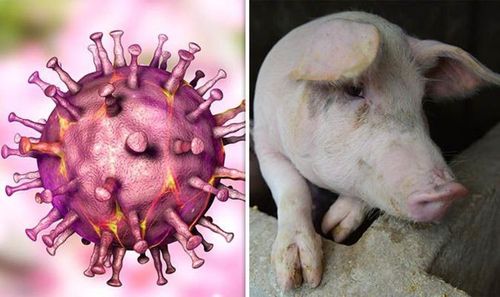This is an automatically translated article.
The article is professionally consulted by Associate Professor, Doctor, Doctor Hoang Dang Mich - Head of Department of Medical Examination & Internal Medicine - Vinmec Ha Long International Hospital.African swine fever is a contagious viral disease of pigs, both domestic and wild boar are at risk of infection. Although African swine fever does not pose a direct threat to human health, the potential risk is because cholera pigs are very susceptible to other disease-causing viruses due to superinfection.
1. What is African swine fever?
According to the World Organization for Animal Health (OIE for short), African swine fever is an infectious disease caused by a virus found in the blood, organs and secretions of infected pigs. Swine fever spreads rapidly with swine species, occurs in all pig breeds and ages, and has a mortality rate of 100% in infected pigs.
In 1921, African swine fever first appeared in Kenya, then spread rapidly and became epidemic in many African countries. In 1957, African swine fever was first detected in Europe. In 2007, this disease appeared in pigs in the Americas. So far, African swine fever has occurred in many countries around the world, with 12 countries having recorded outbreaks of African swine fever.
2. Symptoms of pigs infected with swine fever

In the acute form of swine fever, infected pigs may have a high fever (40.5 - 42 degrees Celsius), but pigs have no noticeable symptoms for the first few days of infection, then pigs gradually loss of appetite, inactivity, moodiness, lying in shade or near water for the first 2-3 days.
With white pigs, its 4 limbs can turn blue-violet with hemorrhage (white skin turns red) on the ears, tail and chest, abdomen. In 1-2 days before the death of pigs, they will have neurological symptoms, unsteady movements, abnormal breathing, difficulty breathing or bloody foam when breathing in the nose, eye inflammation, vomiting accompanied by diarrhea. sometimes bloody or possibly constipated, stools with mucus and blood. Pigs usually die within 6-13 days or even 20 days of infection. Infected pregnant sows will miscarry at all stages of pregnancy. In the acute form of swine cholera, the pig mortality rate is 100%.
Subacute form: Pigs exhibit mild fever, increasing and decreasing, lazy to eat, losing weight, moody mood, cough, difficulty breathing, arthritis, difficulty walking, pregnant sows will miscarry. Pigs infected with subacute cholera usually die within 15 - 45 days, the mortality rate is about 30 - 70%. Pigs that can recover from illness or become chronically ill will have a chronic, asymptomatic viral infection, but they will be lifelong hosts of the ASF virus.
3. Cholera is transmitted by which way to enter the human body?
Currently, African swine fever does not spread directly to humans. Unlike swine flu, African swine fever does not pose a direct threat to human health.
However, according to professors of the Vietnam Agriculture Academy: "Swine cholera does not cause disease directly in humans, but cholera virus is capable of transmitting to flies, mosquitoes, mice, cats, chickens and ducks". Pigs infected with cholera can suffer from other dangerous diseases such as: blue ear disease, influenza, typhoid, etc. These diseases have the potential to cause harm to human health and cause trouble. digestive system disorders, especially when eating blood pudding, sick pork has not been cooked thoroughly. While caring for and handling pigs with cholera, it is necessary to ensure the correct procedure and the caregiver must wear clothes, hats, and gloves to isolate from feces, urine, and fluids in the barn.
When pigs are co-infected with blue ear disease, streptococci that are present in the secretions of the animal's mouth and nose will flare up. People with skin scratches or open wounds when in contact with infected pigs will be infected with bacteria.
Patients often have high fever, headache, nausea, bleeding in some places on the body, some cases also show symptoms of digestive toxicity, more severe than meningitis.
4. Preventing the outbreak of African swine fever

The most effective way to prevent African swine fever today is to apply biological measures. Regularly clean the barn, spray disinfectant to kill pathogens, prevent insects and rodents because they can carry swine cholera from one place to another. Do not buy, sell, transport and consume infected pigs or pigs suspected of being sick. Do not buy pork of unknown origin, do not use leftovers, uncooked food from pork.
Previously, the Department of Animal Health announced that more than 200 pigs were infected with African swine fever in Hung Yen and Thai Binh, the destruction and disinfection of the environment and prevention of the spread of the disease are being carried out by the authorities. conductability. In recent days, Quang Nam and Ha Tinh respectively detected pigs infected with African swine fever in the area and destroyed dozens of infected animals.
Please dial HOTLINE for more information or register for an appointment HERE. Download MyVinmec app to make appointments faster and to manage your bookings easily.













